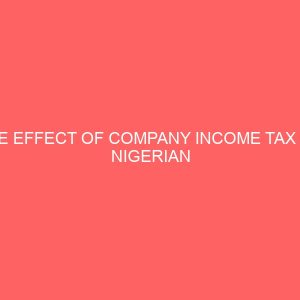Description
THIS RESEARCH WORK IS ON THE IMPACT OF FEDERALLY COLLECTED TAXES ON ECONOMIC GROWTH.
ABSTRACT
This study has investigated the impact of tax revenue on economic growth. The study relied primarily on secondary data from journals, textbooks, magazines, newspapers and internet sources. The study made use of the judgmental sampling technique. The Central Bank of Nigeria (CBN) and Federal Inland Revenue Service (FIRS) was chosen for the study.
This study adopted both descriptive and inferential statistical analyses, the data were analyzed using SPSS v22, the statistical tools adopted was the Ordinary Least Square (OLS) regression technique.
The result of the regression analysis reveals petroleum profit tax and capital income tax were not statistically significant at 5% level of significance, this means that irregular fluctuation in this revenue could not permit the level of economic growth required from it, in the same vein value added tax and customs and excise duties has significant impact on economic growth during the period under review.
The study concludes that federally collected revenue has significant impact on economic growth. The study recommends tat; There should be stringent penalty imposed on any individual or corporate body who indulge in any form of tax malpractices irrespective of states; Efforts should be intensified by the government towards increased collection of tax revenue this is due to the low contribution of tax revenue to GDP over the period of study; Government through Federal Inland Revenue Service should create an effective and reliable data base for every vatable persons to minimize (if not eliminate) the incidence of tax evasion and there should be constant training and re-training of VAT administrators through seminars, conference to keep them abreast with the modern trend in tax administration; Government should also be able to use taxpayers’ monies in the provision of infrastructural facilities.
CHAPTER ONE
INTRODUCTION
1.1 Background to the Study
Income tax is one of the major sources of revenue for the federal government. The taxes collected come back to the tax payers in form of social amenities such as pipe-borne water, electricity, health centers, good roads, schools, building of market etc. all these are what they benefit from the tax pay.
Nightingale (1997) describes tax as a compulsory contribution imposed by the government and concludes that even though tax payers may receive nothing identifiable in return for their contributions, they nevertheless have the benefit of living in a relatively educated, healthy and safe society.
According to Soyode & Kajola (2006:4), taxation is defined as “the process of levying and collection of tax from taxable persons”. Taxation has been one of the ways in which government is able to finance its activities. Government imposes levies on individuals, companies; organizations in the form of tax so government, namely the federal government, state government and the local government. The role of tax cannot be underestimated at all. In some developed economies, that has no mineral resources to which they can tap into and make considerable gains. However, in less developed economies like Nigeria the tax system keeps getting reviewed from time to time and keeps getting updated. Some of these reviews include the introduction Tax Identification Number (TIN) in 2008.
Taxes are generally grouped into two, direct and indirect taxes. Direct taxes are taxes from income and wealth rather than consumption and expenditure. Income tax is payable by both physical persons and legal entities (companies) including associations of persons, etc. The rates payable are determined for each year of assessment and are prescribed in the yearly budgets. A company, being a legal entity with management distinct and separate from individual shareholders that own it, also pays income tax called company income tax. Other direct taxes include provisions for taxation of capital gains and gifts, an annual tax on wealth and estate duties. These taxes are subject to evasion and avoidance than indirect tax. This is one of the reasons for looking for the optimal structure of taxation that will raise the highest amount of revenue without distorting the ability to pay.
The earliest trace of any form of direct taxation in Nigeria even before the British administration was in the northern Nigeria. The north was favored for this because it had a form of organized central administration under the emirs unlike the south which except in few places in the west was not organized. In 1904, Late Lord Lugard introduced income tax in Nigeria. It started as a community tax which later culminated in the Native Revenue Ordinance in 1917. In 1918, an amended ordinance extended the provisions of 1917 Ordinance to Southern Nigeria. The first Ordinance applied to Abeokuta in Ogun state and to Benin City in Edo state and in 1928, it was extended to the Eastern Nigeria. The Nigeria income taxation did not start until 1940 when the Native Revenue Ordinances of 1917, 1918 and 1928 were incorporated in the direct taxation
Under Ordinance No 4 of 1940 cap. 54, (hereinafter referred to as the Ordinance) which repealed the Native Ordinance, cap 74 in the 1923 edition and the Native Direct Taxation (Colony) – Ordinance No. 41 of 1937. This Ordinance was however discriminatory as it applied to natives in Nigeria elsewhere, that is, other than in the township of Lagos. However, a more comprehensive Income Tax Ordinance No. 29 of 1943 which came into effect on 1st April 1943 governed the assessment of the income of non-Africans resident outside Lagos as well as Africans and non-Africans resident in Lagos. After the Income Tax Ordinance of 1943, there was no significant change in the tax system until 1956.
However, the Northern Region did not pass its own personal income tax law until 1962. All the regional tax laws later formed the basis of personal income taxation in all the states that were created out of the Regions. In the Federal Territory of Lagos, the Income Tax Ordinance, 1943, remained in force until the Personal Income Tax (Lagos) Act 1961 enacted by the Federal Government. It was the 1961 enactment that gave birth to separate laws on income and profit of both individuals and companies namely Income Tax Management Act (ITMA); and Companies Income Tax Act (CITA). The Petroleum Profit Ordinance was passed in 1959 but took effect from 1st January 1958. So many laws have been passed to date on taxation in Nigeria.
Economic growth occurs where there is an increase in the productive potential of the economy and is the best measured by the increase in a country’s real level of output over a period of time, i.e. the increase in real Gross Domestic Product. Economic Development is a process where there is an improvement in the lives of all people in the country. This involves not only the standard of living, such as greater availability of goods and services (and also ability to purchase them) but also the promotion of attributes such as self-esteem, dignity and respect, and to take control of their own lives. Nigeria is the biggest economy in Africa. Services are the largest sector of the economy, accounting for about 50 percent of total GDP. One of the fastest growing segments in Services is Information and Communication, which together account for about 10 percent of the total output. Agriculture, which in the past was the biggest sector, now weights around 23 percent. Crude Petroleum and Natural Gas constitute only 11 percent of total GDP, while being the main exports. Industry and Construction account for the remaining 16 percent of GDP.
According to Olashore (1999), the Nigerian economy has remained in a deep slumber with macroeconomic indicators reflecting an economy in dire need of rejuvenation, revival and indeed radical reform.
1.2 Statement of the Problem
There is a general lack of consensus among scholars on the contribution of Federal tax revenue to the economic growth of nations. For instance, whereas Ariyo (1997) in his study of the Nigerian tax system documented a satisfactory level of productivity of the tax system before the oil boom, Festus and Samuel (2007) established that the role of Federal tax revenue in promoting economic activities and growth is not felt in Nigeria. The two studies reflect that the oil boom has not improved the economic state of the country since before the boom; there was a level of satisfactory and after the boom, the growth and economic activities deteriorated.
It has been observed that federally collected taxes have not really achieved the objective of contributing to the economic development and growth of Nigeria, which has been attributed by the government and practitioners to poor tax administration, tax evasion and non-compliance with tax laws by the tax payers. These therefore make it imperative to carry out this research.
1.3 Objectives of the Study:
The main objective of this research was to evaluate the impact of federally collected taxes on the Nigerian economy with a view to determining their contribution to the growth and development of the national economy.
The specific objectives are to:
- Evaluate if Petroleum Profit tax is contributing positively to the growth and development of Nigerian economy.
- Access if Company Income Tax is contributing positively to the growth and development of the Nigeria economy.
- Determine if Value Added Tax is contributing positively to the growth and development of Nigerian economy.
- Access the impact of Customs and Excise duty on the growth and development of Nigerian economy.
1.4 Research Questions:
- To what extent does Petroleum Profit Tax contribute to the economic growth and development of the Nigerian economy?
- How does Company Income Tax contribute to the growth and development of Nigerian economy?
- In what way does Value Added Tax contribute to the growth and development of Nigerian economy?
- What impact does Customs and Excise duty have on growth and development of the Nigerian economy?
1.5 Research Hypothesis:
Hypothesis 1: H0= Petroleum Profit Tax does not have a significant relationship with the growth and development (GDP) of Nigerian economy.
Hypothesis 2: H0= There is no significant relationship between Company Income Tax and the growth and development (GDP) of Nigerian economy.
Hypothesis 3: H0= Value Added tax has no significant relationship with the growth and development (GDP) of Nigerian economy.
Hypothesis 4: H0=There is no strong relationship between Custom and excise duty and the growth and development (GDP) of Nigerian economy.
1.6 Significance of Study
Tax revenue is one of the sources of revenue to the government. This can be used to achieve economic growth, maintain equilibrium in the economy by combating elements of depression, inflation, or deflation, achieve equity in income and wealth distribution and address issues of poverty and promote socioeconomic development, hence the need to find out the extent Federal tax revenue impacts on Nigeria’s economic growth.
This study will enlighten individuals, organizations; government on the impact of federal income taxes to the economic growth and development of Nigeria. The findings of the research may also serve as reference for policy lines to the Nigerian government and policy makers. This topic can also provide a guide for further researches to academicians, students and researchers.
1.7 Scope of the Study
The scope of this study covered the impact of federally collected taxes on economic growth and development over a period of seventeen years (from 2000-2017). The trend of the Company Income tax, Petroleum Profit tax, Customs and Excise duty and valued added tax are examined for the period to determine their correlation with the Nigerian economy which will be captured as Gross Domestic Product (GDP). The focus was based on the data obtained at the Federal Inland Revenue Service (FIRS).
The three major tiers of government: Federal Government, State Government and Local Government have been saddled with the responsibility of collecting taxes in Nigeria. The Federal Government uses the Federal Inland Revenue Service (FIRS) to deal with taxes that are paid by companies and Federal Capital Territory. Under this research, we examined the federal taxes collected by the government and its contribution to the Nigerian economy.
1.8 Operationalization of Variables
The purpose of this study was to examine the impact of tax revenue collected by Federal Government on economic growth in Nigeria.
To achieve this, two variables were identified in the study; these are Independent and dependent variables. The independent variables are the federally Collected Taxes generated in Nigeria in the following dimensions as surrogates: Companies Income Tax (CIT), Petroleum Profit Tax (PPT), Custom and Excise Duties (CED), and Value Added Tax (VAT). The dependent variable on the other hand is Economic Growth (EG) measured by Gross Domestic Product (GDP) of Nigeria.
The following models have been adopted
Y=f(X)
Y= y1
X=x1, x2, x3, x4
Where;
Y= Economic Growth (EG)
y1= Gross Domestic Product (GDP)
X= Federally Collected Taxes (FCT)
x1= Companies Income Tax (CIT)
x2= Petroleum Profit Tax (PPT)
x3= Customs and Excise Duties (CED)
x4= Value Added Tax
Functional Relationships
GDP=f (CIT)………………..1
GDP=f (PPT)………………..2
GDP=f (CED)……………….3
GDP=f (VAT)……………….4
GDP= f (CIT, PPT, CED, VAT)…………5
The above functional relationships are the underlying functions of the impact of federal collected taxes on the economic growth of Nigeria.
1.9 Operational Definition of Terms
- Tax:
Nightingale (1997) describes tax as a compulsory contribution imposed by the government and concludes that even though tax payers may receive nothing identifiable in return for their contributions, they nevertheless have the benefit of living in a relatively educated, healthy and safe society
- Taxation:
Taxation is defined as the process of levying and collection of tax from taxable persons.
- Economic Growth:
This occurs where there is an increase in the productive potential of the economy and is the best measured by the increase in a country’s real level of output over a period of time, i.e. the increase in real Gross Domestic Product.
- Economic Development:
This is a process where there is an improvement in the lives of all people in the country. This involves not only the standard of living, such as greater availability of goods and services (and also ability to purchase them) but also the promotion of attributes such as self-esteem, dignity and respect, and to take control of their own lives.
- Value Added Tax:
It can also be defined as a tax on spending/consumption levied at every stage of a transaction but eventually borne by the final consumer of such goods and services. It is
levied at the rate of 5%.
- Nigeria Tax Authorities:
This refers to the revenue collection, agencies of the federal government represented by the Federal Inland Revenue service (FIRS), State Inland Revenue Service (SIRS) and Local Government Revenue Committee.








Reviews
There are no reviews yet.